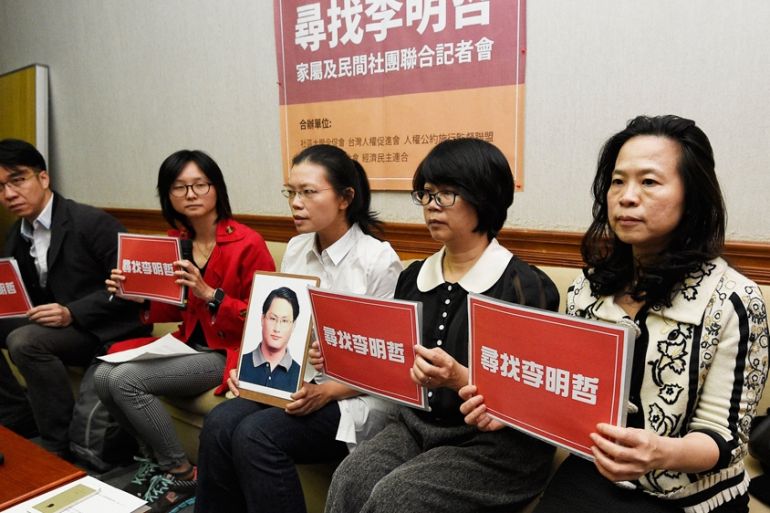Missing Taiwan activist allegedly detained in China
Lee Ming-che disappeared after clearing immigration in Macau on March 19, but China remains mum about his whereabouts.

A Taiwanese human rights advocate who went missing last week in China has been arrested by mainland authorities, according to his wife.
Lee Ching-yu, the wife of non-governmental activist Lee Ming-che, said in a statement on Tuesday that reliable government sources suggest her husband has been detained by Chinese security officials.
“I want the government of China to act like a civilised country and tell me what they’re doing with my husband on what legal grounds and … what they plan to do with him,” Lee said.
The Taiwan Association for Human Rights said Lee disappeared after clearing immigration on March 19 in Macau, and never showed up for a planned meeting later that day with a friend across the border in China’s city of Zhuhai.
READ MORE: China cuts communication channel with Taiwan
On Tuesday, Lee’s wife visited the Straits Exchange Foundation (SEF), a semi-official organisation handling business matters involving China.
She said her husband might need more money to get “food and hypertension” medicine.
SEF spokeswoman Lee Li-jen said her organisation has twice contacted its counterpart in China, the Association for Relations Across the Taiwan Straits, but received no response.
“We will contact them later today again, hoping to get more details,” she told AP news agency.
Police and government officials in southern China either could not be reached or said they had no information about Lee. China’s foreign ministry said it was unaware of his case.
‘One China’ dispute
Cheng Hsiu-chuan, president of a Taipei college where Lee worked, told AP the 42-year-old may have attracted the attention of Chinese security after using the Chinese social media service WeChat to “teach” China-Taiwan relations to an unknown number of people.
“For China, the material he was teaching would be seen as sensitive,” Cheng said.
Cheng said Beijing should release public records about his entry, such as CCTV images.
“The Mainland Affairs Council has engaged. We’ll do our best,” Taiwan’s presidential spokesman Alex Huang said late on Tuesday.
In June, China halted communications with Taiwan, a move triggered by Taiwan President Tsai Ing-wen’s failure to endorse the “one China” principle, which requires countries that seek diplomatic relations with China to break official relations with Taiwan.
China and Taiwan split amid civil war in 1949. China insists the two sides must eventually unify – by force, if necessary.
|
|